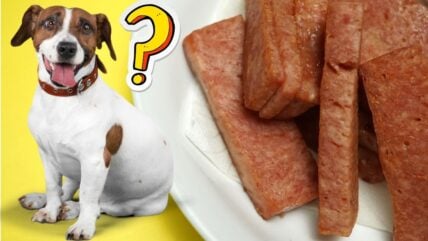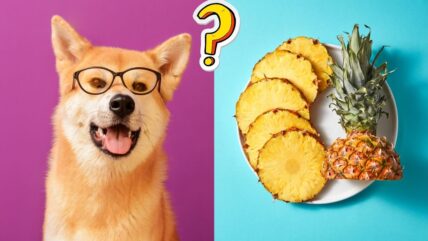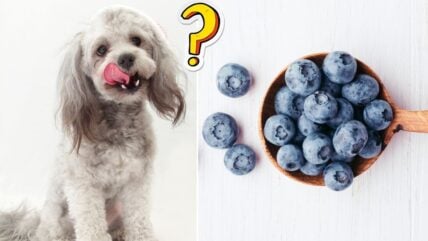Can Dogs Eat This? Dog Food Nutrition & Recipes Recipes
Can Dogs Eat Carrots? Get To The Root of This Question
Who doesn’t love a crunchy, slightly sweet, deliciously nutritious carrot? Added to a stew, roasted in the oven, shredded for a salad, or added to cake batter, carrots are a staple vegetable in many “human food” recipes. Most of us keep a bag of carrots in the fridge, so they’re always on hand for healthy snacking, but can everyone in your family enjoy eating carrots?
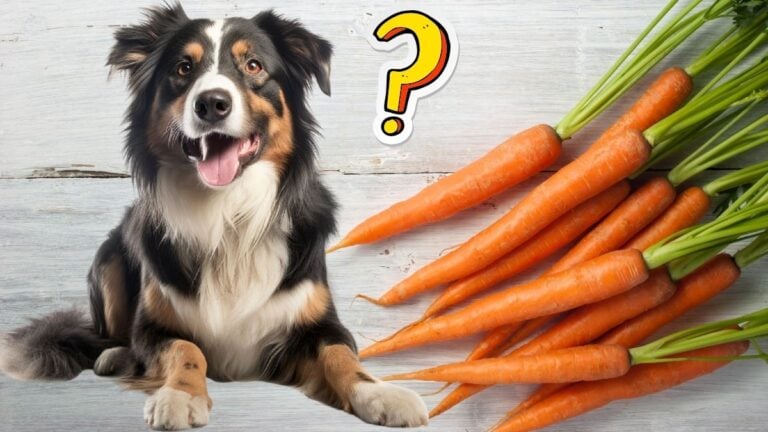
Can dogs eat carrots? Yes—dogs can eat carrots, and they make excellent low-calorie treats for dogs who love to chew. One of the safest vegetables for dogs to eat, almost every dog loves both the flavor and texture of carrots, and they can enjoy health benefits from this root veggie, too.
Like all foods you feed your dog, it’s important to know how to add carrots to your dog’s diet. Moderation is always key, and I recommend starting slow when introducing a new food to your furry friend. Even dog-safe foods like carrots should be prepared correctly and fed to your dog with intention.
Without further ado, let’s dive into everything you need to know about feeding dogs carrots including nutrition information, carrot dog treat recipes, and answers to your most asked questions.
Are Carrots Good For Dogs? Health & Nutrition Info
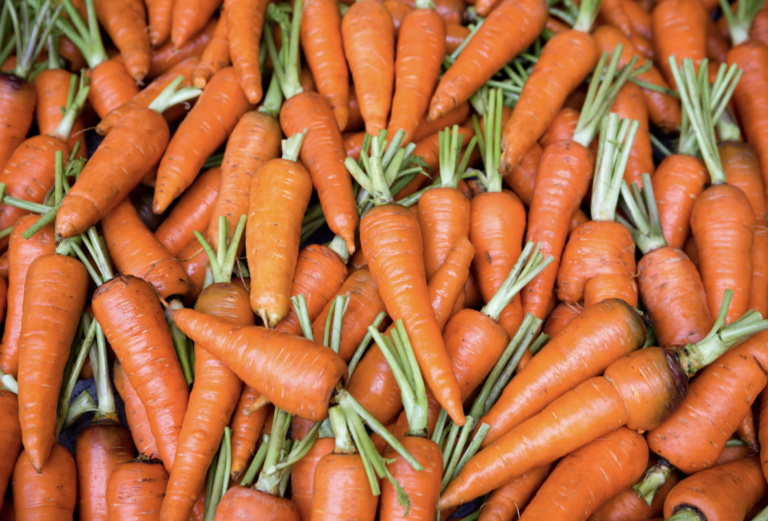
Carrots are good for dogs, but shouldn’t be their main source of calories or nutrition. As a treat or added ingredient to dog food, carrots provide essential dietary fiber, antioxidants, vitamins, and minerals. If your dog eats carrots as a regular part of their diet, they can enjoy some of the benefits of the nutrients found in carrots.
| Nutrition & Health Benefits of Carrots for Dogs | |
| Nutrient | Benefit for Dogs |
| Beta Carotene | Supports healthy immune function, eye/vision health, bone growth, and skin/coat health. |
| Dietary Fiber | Supports healthy digestion and nutrient absorption. |
| Niacin | Supports energy production, digestion, neurological function, and cognition. |
| Potassium | Supports cardiac function, nerve, and muscle health. |
| Vitamin A | Provides antioxidant support against free radicals, supports vision and eye health, bone growth, etc. |
| Vitamin B6 | Supports immunity and blood oxygenation. |
| Vitamin C | An antioxidant, vitamin C protects against free radicals and inflammation, and supports skin and coat health. |
| Vitamin K | Supports fast healing and recovery from injuries. |
How To Safely Feed Carrots To Your Dog
Any treat for your dog needs to be fed to them safely and with awareness for their digestive system. Dogs are facultative carnivores, and their digestive systems do best with animal-based protein and foods but can also digest and pull nutrients from non-animal-based foods. Carrots aren’t a food you should feed your dog as the bulk of their diet, but they make a great healthy treat.
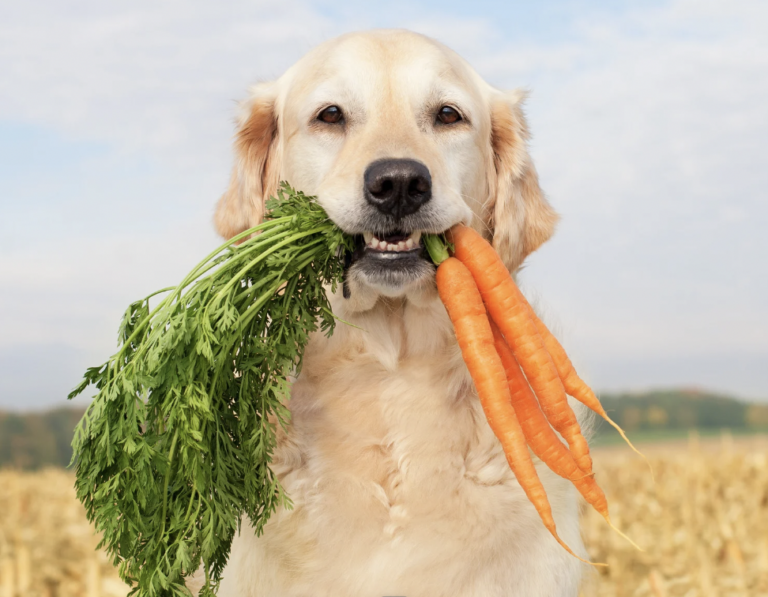
How Many Carrots Can a Dog Eat a Day?
Even healthy treats should be eaten in moderation. 90% of your dog’s daily caloric intake should be from their regular dog food, and it’s important not to give your dog so many treats that you disrupt their digestion or make them gain unwanted weight.
Small dogs should only have 1–2 baby carrots or small pieces of carrot at a time, while medium and large dogs can have 1–3.
Can Dogs Eat Carrots Every Day?
Some foods should only be occasional treats for dogs, limited to once every few weeks, or less. On the other hand, dogs can eat carrots 2–3 times a week as a treat, or daily if they are an ingredient in their dog food.
Can Dogs Eat Raw Carrots?
Some vegetables should be cooked before you give them to your pooch but can dogs eat carrots raw?
Yes! Raw carrots are safe for dogs, and the experience of eating carrots raw rather than cooked gives your dog better sensory stimulation. The texture of crunchy carrots is something most dogs love, especially dogs who love to chew.
While it is safe for dogs to eat raw carrots, they can be a little difficult to digest. It’s not uncommon to find chunks of undigested carrot in your dog’s stool after they enjoy this treat, but as long as you are feeding in moderation this isn’t an issue.
Raw carrots can also be a choking hazard, so always supervise your dog while they eat this veggie.
Can Dogs Eat Cooked Carrots?
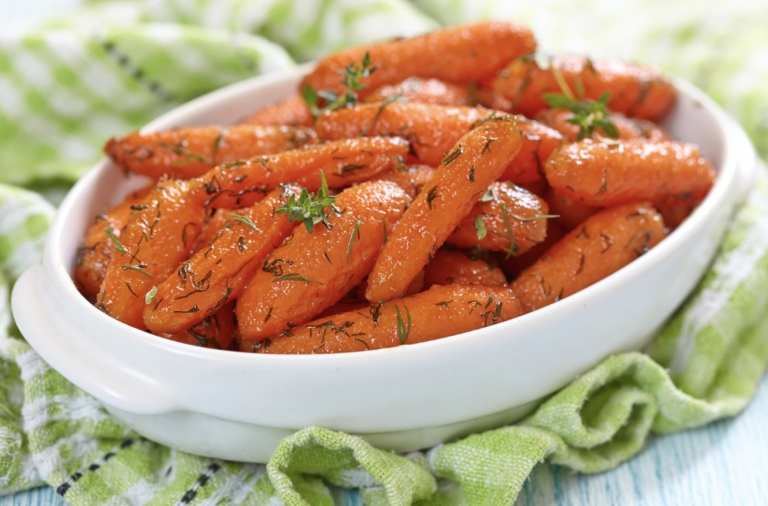
Yes! Cooked carrots are safe for dogs to eat, and a little easier to digest than raw carrots. Dogs who enjoy sweet foods might also prefer cooked carrots since cooking enhances the flavor of the natural sugars in this root vegetable.
Can Dogs Eat Frozen Carrots?
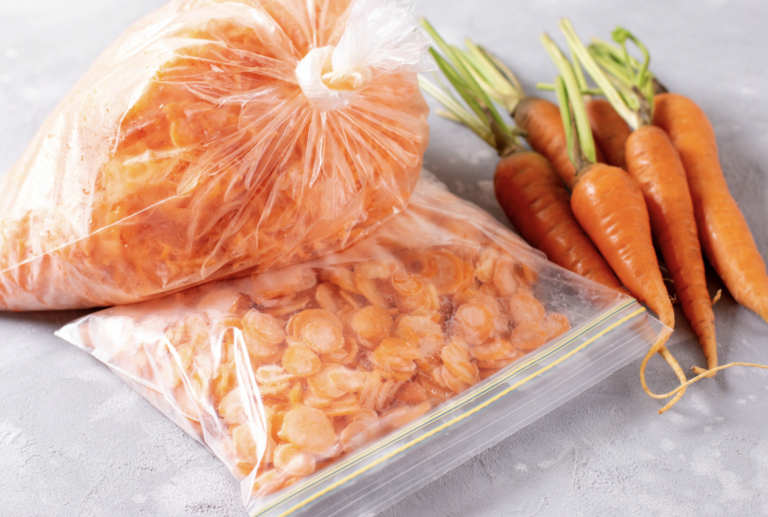
Yes—as long as they are cooked first! Frozen carrots are a great alternative to other chews, and are sometimes even recommended as a teething aid for puppies and adolescent dogs. Many pet parents swear by frozen carrots to keep their dogs occupied, and I’ve included a delicious chicken-flavored frozen carrot recipe below so you can test it out with your own dog.
Frozen carrots can pose a choking hazard, so you should supervise your dog with this treat.
3 Delicious Carrot Dog Treat Recipes
Plain raw or cooked carrots are great snacks for your dog, but you can also use this healthy root vegetable in dog treat recipes! Here are three ways to add carrots to your dog’s diet by featuring—or hiding—them in homemade dog treats.
1. Two-Ingredient Frozen Beef & Carrot Chews
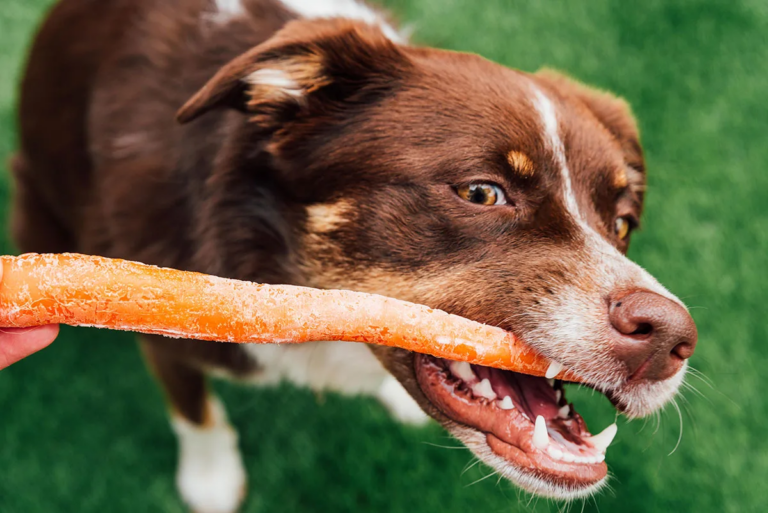
| Prep Time | 5 minutes |
| Cook Time | 20 minutes |
| Freeze Time: | 2–12 hours |
| Yield: | 10 chews |
Do you have a dog who loves to chew, and goes through way too many bones? Maybe your dog is teething and needs something to satisfy their need to chew. Meet the frozen carrot! There are lots of ways to make frozen carrot chews, but this quick and easy recipe comes to us from Sarah at Bone Appétreat and requires only two ingredients.
Because these frozen carrots are pretty big, I recommend them for medium and large dogs, but you could also make this recipe with baby carrots or carrot sticks. I also don’t necessarily recommend feeding your dog the entire carrot. If your dog won’t let you take a treat from them, try making these into smaller bites.
Most important in this recipe is choosing the right beef broth. My advice is to purchase a broth specifically made for dogs or to make your own without added salt, garlic, onions, pepper, or other seasonings that could upset your dog’s stomach.
Ingredients
- 2 lbs whole carrots
- 32 oz. beef broth (dog safe, with no added salt, garlic, onion, etc.)
- Water, as needed
Instructions
- Wash the carrots, then place them in a large stock pot. Pour the beef broth over the carrots, and top with water if necessary so that all of the carrots are covered.
- Bring the pot to a boil and cook the carrots for 20–30 minutes or until the carrots are tender but not falling apart.
- Transfer the cooked carrots to a baking sheet lined with parchment paper and place in the freezer. Freeze for 2–12 hours, or until solid.
2. Carrot Cake Pupcakes with Peanut Butter Frosting
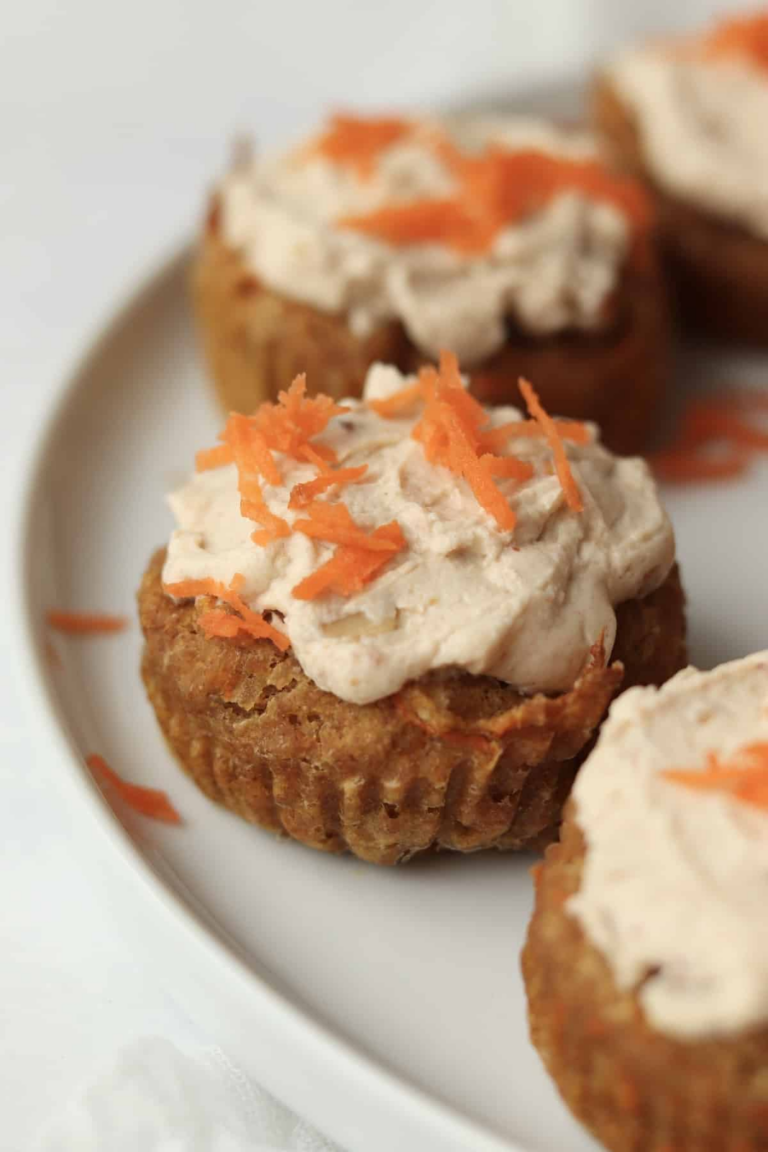
| Prep Time | 15 minutes |
| Cook Time | 30 minutes |
| Yield | 12 pupcakes |
While carrot cake made for humans is something you should never feed your dog, carrot pupcakes are a safe and super-fun treat for special occasions! Make these soft, carrot-filled cupcakes for your pup’s birthday, gotcha day, or as a just-because to show them how much you care.
Ingredients
Carrot Cake:
- ½ cup canned pumpkin puree (100% pumpkin, no added ingredients)
- ½ cup unsweetened applesauce
- 2 TBSP melted coconut oil
- ½ cup water
- 1 egg
- 1 cup whole wheat flour
- 1 tsp baking powder
- ½ cup shredded carrot
Peanut Butter Frosting:
- ½ cup plain Greek yogurt
- ¼ cup peanut butter (xylitol-free)
Instructions
- Preheat your oven to 350℉ and line a standard muffin tin with paper liners.
- To a large bowl add pumpkin, applesauce, coconut oil, water, and egg. Mix well to combine.
- Add the flour and baking powder, mixing well so there are no clumps or dry patches.
- Gently fold in the grated carrot.
- Fill each well of the muffin tin ⅔–¾ full with batter, and transfer into the middle of your preheated oven.
- Bake the pupcakes for 25–30 minutes. Test for doneness by inserting a toothpick into a pupcake—if it comes out clean, it’s done. If wet batter is left on the toothpick, continue baking for 2–5 minute intervals until done.
- While the pupcakes cool, mix the Greek yogurt and peanut butter to make a thick but slightly runny frosting. Frost the pupcakes once they are fully cooled, or right before serving.
3. Crispy Carrot Dog Biscuits
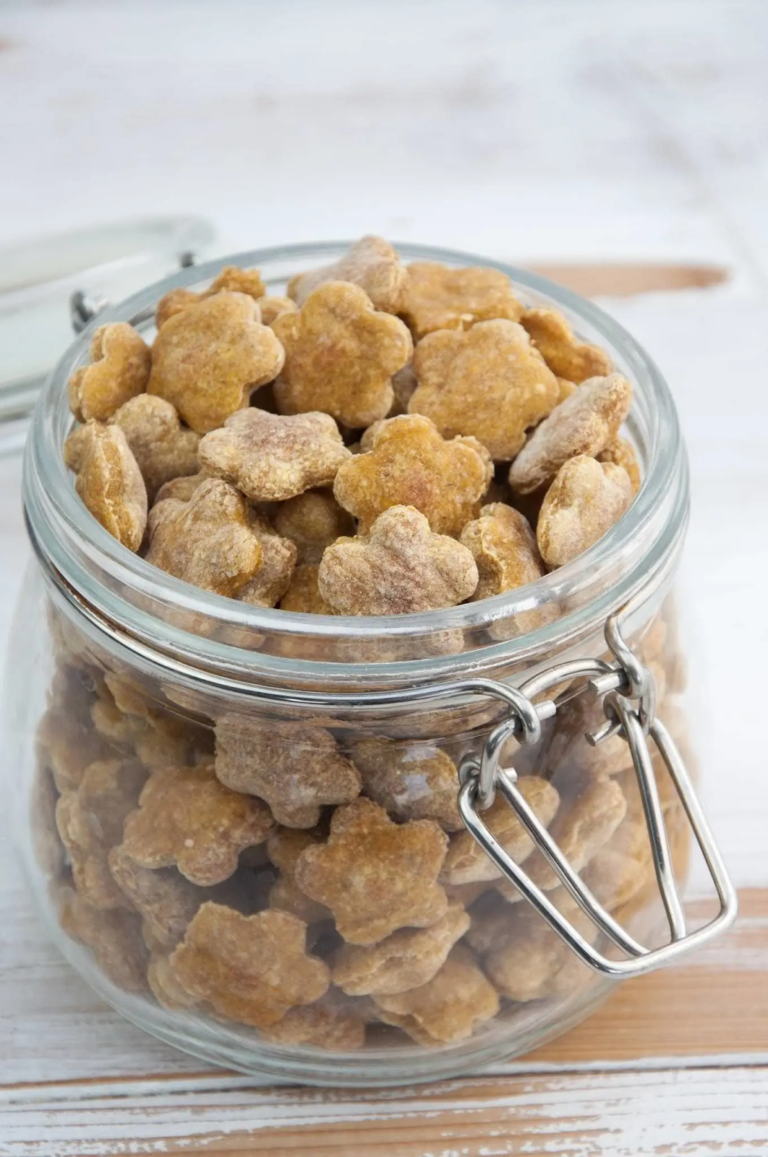
| Prep Time | 20 minutes |
| Cook Time | 15 minutes |
| Yield | 100+ biscuits |
Created by Bianca from Elephantastic Vegan, this recipe makes more than 100 tiny treats that are the perfect size for small dogs or training sessions. Healthy and low-calorie, you don’t have to worry about giving your pup a whole handful of these if they’re learning a new trick, or just deserve a bunch of treats!
Ingredients
- 2 carrots
- ⅓ cup water
- ⅓ cup whole wheat flour
- ⅓ cup oat flour
- ⅓ cup all-purpose flour
- 1 pinch cinnamon
Instructions
- Preheat your oven to 400℉ and prepare a baking sheet by lining it with parchment paper.
- Combine carrots and water in a blender and process until mostly combined but not completely smooth.
- Add ½ cup of the carrot puree to a large bowl with the rest of the ingredients and stir to combine. You may need to switch to using your hands to create a smooth dough. If you find it too sticky to handle, add more all-purpose flour, one tablespoon at a time. If it is dry and crumbly, add more carrot puree one tablespoon at a time.
- Lay out a sheet of parchment paper on a work surface and lightly sprinkle it with flour.
- Dump out your dough onto the parchment paper and, using a rolling pin, roll it into a ½-inch thick sheet.
- Using a small cookie cutter (approximately ½-inch wide) cut out your biscuits, and transfer them to your lined baking sheet.
- Bake the biscuits for about 15 minutes or until crispy and lightly browned on the edges.
Can Dogs Eat Carrots? FAQ
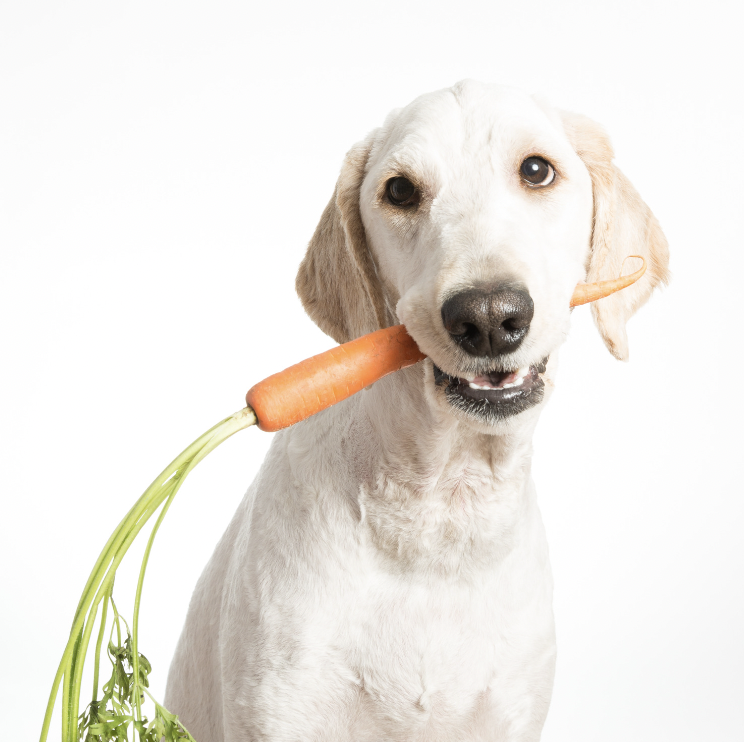
Learn even more about this healthy treat for your dog by reading my answers to the internet’s most common questions about feeding carrots to their pups.
Can dogs eat baby carrots?
Yes! Baby carrots are just regular carrots cut into cute, snack-sized pieces and are completely safe for dogs to eat.
Can dogs eat purple carrots?
Yes! Although purple carrots may have slightly different vitamins and minerals than yellow or orange carrots because of their pigmentation, there is no functional difference between their essential nutrients.
Can dogs eat yellow carrots?
Yes! Yellow carrots are perfectly safe for dogs to eat—dogs can eat carrots of any color.
Can dogs eat rainbow carrots?
Yes! Rainbow carrots are just a mixture of different carrot colors, and all carrots are safe for dogs to eat.
Can dogs eat carrot tops?
Yes! Carrot tops are safe for dogs to eat, are rich in fiber, and quite tasty.
Can dogs eat canned carrots?
No. Most canned carrots are made with added salt, preservatives, and other ingredients that could give your dog an upset stomach and are ultimately not healthy for your dog.
Can dogs eat celery and carrots?
Yes! Both carrots and celery are safe vegetables for dogs to eat. I recommend removing the “strings” of fiber from the celery to prevent your dog from catching them in their teeth.
Can dogs eat peas and carrots?
Yes—so long as they haven’t been cooked with salt, butter, oil, or other seasonings. Plain peas and carrots are safe for dogs but “people food” versions of peas and carrots are often made with fat, added sodium, and seasonings that aren’t good for your dog. Dogs can also eat carrots and green beans with the same caveats.
Can dogs eat boiled potatoes and carrots?
Yes—assuming they haven’t been cooked with salt, butter, oil, or other seasonings.
Can dogs eat carrot cake?
No! Carrot cake is high in sugar, butter, cream cheese, and other ingredients that aren’t good for your dog. Most carrot cakes also contain raisins, which are toxic to dogs and in large amounts, can lead to kidney failure. Dog owners should never allow their dogs to eat foods containing raisins or grapes—even small amounts can risk your dog’s health.

